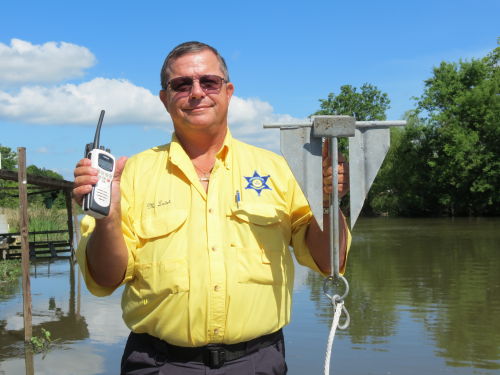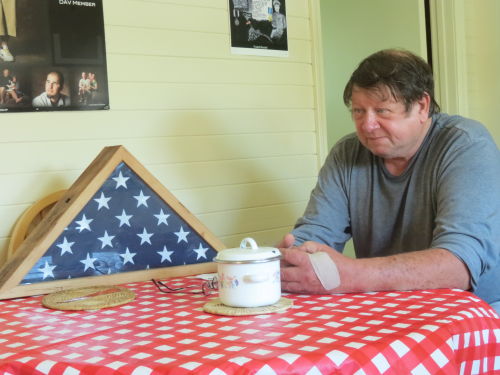
Wayne Patrick Oncale
May 20, 2014
For want of an anchor, almost unhappy ending
May 21, 2014As federal prosecutors review the U.S. Department of Veterans Affairs waiting lists to determine whether officials who falsified data regarding veterans seeking medical care committed crimes, a particularly interested set of eyes is watching.
Men and women from the bayou region who served their nation in uniform have their own complaints, in some cases, about their health care dealings with the department. None reach the level of the scandal that has played out nationally, of long waits for critical care, possibly contributing to deaths. Indeed, several have high praise for the VA clinic in Houma that is run under contract by Humana, a nationwide health care company.
But all agree that there is room for improvement, and hope the current focus will in the long run make for change.
“It took us nine years to get a VA clinic in Houma. We had to fight to get it here because by the time you got an appointment in New Orleans it was time to die,” said Roger Songe, commander of the Disabled American Veterans Houma chapter. “But now it’s getting bad here. One veteran I have been helping wanted to go to the VA and they said they can’t see him for three weeks. If you have an emergency they tell you go to the nearest emergency room. But then they won’t pay for it.”
Completion of a new VA hospital in New Orleans, veterans say, might make their plight easier.
But the $1 billion project won’t be completed until at least 2016, and Songe and other veterans’ advocates say they don’t know if that timetable fits with the needs of veterans. They are currently being seen in Houston, or at local hospitals when the local VA clearinghouse refers them.
The nurse practitioners who see vets at the Houma clinic can only refer for serious conditions, but Songe and other vets say there are not nearly enough of them.
“There need to be more physicians on staff so that veterans can see a doctor when they need to see one,” he said.
A major complaint about the Houma clinic is that veterans who have blood tests or other lab work done often don’t get informed of results, or at least not in a timely fashion.
A call to the administrator at the clinic for comment Monday resulted in a referral to the Veterans Administration regional director, who had not returned the call by press time.
Some local veterans said they registered at a veteran’s clinic in Reserve, because better treatment in their minds was worth the extra travel. But not all Houma vets have the luxury of easy transportation to different places.
Problems at the Houma clinic appear as major faux pas to the vets, who say they deserve a level of care that most people seeing private physicians take for granted. Not being informed of specifics on blood tests is one example.
“They tell us if there is nothing wrong they don’t have to call,” said Glenn Trahan of Houma, who served in the Army in 1970 and 1971, in Chu Lai, Vietnam, at a time when there was a heavy presence of Agent Orange. When he came home from Vietnam he had bi-lateral hearing loss and other problems. “If they don’t let you know for sure something is wrong with you, if there is a problem or not a problem, you stay in limbo. I don’t like that idea.”
Once scheduled for surgery in New Orleans for a damaged arm, Trahan was told after the doctor who originally saw him died that surgery was off.
His problem, he was told, could be managed trough pain pills and other medication.
“I didn’t want pills. I wanted surgery,” he said. “Why were they trying to give me pills when the doctor said I needed surgery? I told them keep their pills.”
Lack of information, he and other veterans say, is an affront to their dignity.
The health care issue for veterans is in the minds of some the tip of a troublesome iceberg. Economic difficulties, social and psychiatric problems make for a tangled web that is difficult for veterans to navigate.
Some fall through the cracks at various times, and even small discrepancies between what they believe is appropriate and what is delivered amount in their minds to broken promises and nothing less.
In a small wood-framed house on Grand Caillou Road is a shelter for veterans down on their luck. They can stay there while getting their feet beneath them again, and get assistance finding permanent housing and jobs.
Operated by Songe and other veterans, the shelter is a welcome port in a stormy world, and offers a beacon of hope for former soldiers, sailors, marines and airmen who have ended up on the street or with housing alternatives that are unattractive at best.
Mike Jordan, who currently stays at the shelter, is a 61-year-old former sailor from Baton Rouge who served in the Vietnam era. He required treatment for a medical condition and was referred by the Houma clinic to Ochsner St. Anne General Hospital in Raceland.
When he checked in, Jordan told hospital staff that they should get an authorization from the Veterans Administration before performing surgery.
“They told me don’t worry about that, the VA will pay for it,” Jordan said. “I ended up getting a $26,000 bill. So I started making calls.”
VA staff members were not helpful, Jordan said, accusing them of being downright insulting.
“I told them that for freezing on the deck of a ship refueling in the middle of the night, the thanks I get is a $26,000 bill. Where is the fairness in that?”
Ochsner staff worked with Jordan and eventually the matter was resolved. But he worries about other vets unwilling or unable to speak up for themselves who end up in similar circumstances.
He is grateful for the respite the veteran’s shelter has provided him. But he would prefer that the nation show its gratitude to him by seeing to it that he and other veterans don’t have to jump through hoops to get what they are entitled to without hassles.
“People who find out I am a veteran say thank you for your service,” he said, while drinking a cup of coffee in the shelter’s homey kitchen. “I don’t want them to say thank you for your service, I want them to do what is right, to give us what we earned.”
Mike Jordan, a Vietnam-era sailor, discusses the national veterans health care crisis, in the kitchen of the veteran’s shelter on Grand Caillou Road in Houma, where he currently resides.











